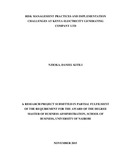| dc.description.abstract | Risk management has always been an important part in organisations due to the number of
risks organisations face. Risks can disrupt achievement of the strategic as well as
operational objectives. Risk exists as a consequence of uncertainty and is present in all
activities whatever the size or complexity, industry or business sector (Mcnaull & Loy,
2008). The main objective of KenGen is to generate power by investing in power facilities.
According to the KenGen 2014 Annual report and financial statement, Kenya is reliant on
power which is subject to erratic weather patterns thereby placing the country in a risk
situation of shortage of power. KenGen intends to attain power production capacity of
3000MW by 2018 and it has so far invested Kshs.250.2 billion to meet the demand of
power in the country. This requires a comprehensive risk management framework to
identify, measure and manage all the risks that might affect the objective of the company
and the same time add value to the stakeholders. This study established the risk
management practices and challenges faced in implementation at KenGen. The data was
collected using the interview guide and analysed using content analysis. The major risks
facing KenGen include hydrology risks, regulatory risks, geothermal steam supply shortage
risks, competition, political risks, security risks, single buyer model, and site acquisition for
project expansion, inadequate stakeholder management, work injuries and plant
breakdowns. The findings supports the risk management process which involves six steps
from setting of risk management objectives, identification of risks, evaluation of risks,
selection of the risk management technique, implementation, control and review. The
research established that KenGen faces several challenges in implementation of risk
management which include culture of high risk appetite, engaging in projects without
identification of risks from planning stage, resistance from staff in implementation of risk
management practices in all activities and lack of an autonomous risk department. The
study recommended that KenGen should come up with well-structured document on how
to conduct risk appraisals of all the projects before the commencement of the projects,
formation of a fully-fledged risk management department at KenGen headed by senior
manager for effective management of risks facing the organisation, the Audit and Risk
Management department should train all the staff on risk management to reduce resistance
at the time of implementation. | en_US |

